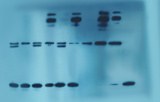
Radiochemicals
Radiochemistry is defined by the chemistry of radioactive elements, for which the radioactive isotopes of the elements are used for studying properties and chemical reactions of non-radioactive isotopes.
All radioisotopes are unstable isotopes that emit radiation as a result of the nuclear disintegration they undergo. The radiation emitted is of three types: Alpha, Beta and Gamma. These three types of radiation are distinguished by their penetrating power. Indeed, alpha radiation can be stopped easily by a few centimeters of air or a sheet of paper, beta radiation can be stopped by aluminum foil and gamma radiation are the most penetrating of the 3 and are more difficult to stop .
Radioisotopes are widely used for diagnostic or research purposes. Radioisotopes present naturally or introduced into the body emit gamma rays and, after detection and treatment of the results, provide information on the anatomy of the person and on the functioning of specific organs. When used in this way the radioisotopes are called tracers.
Radiation therapy also uses radioisotopes in the treatment of certain diseases such as cancer. Powerful sources of gamma rays are also used to sterilize medical equipment.
One of the applications of radioisotopes in biology is the study of DNA with the use of Phosphorus-32 (P-32). The stable phosphorus is replaced by P-32 and the radioactivity is used to analyze molecules and their fate.




